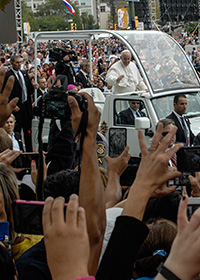Papal Visit Preparations
Southeastern Pennsylvania
September 2015
 For any major event in a city, it’s always important to be prepared for a range of outcomes. The papal visit to the U.S. in September of 2015 was no exception. Preparations and planning began long before the pope actually stepped foot inside the U.S.; preparing cities and states for large crowds and ensuring that plans and protocols were in place should anything go wrong. Philadelphia, as one of the three cities visited by the pope on his trip, prepared the medical community in the region for any events that might pose a risk of overwhelming the health care system.
For any major event in a city, it’s always important to be prepared for a range of outcomes. The papal visit to the U.S. in September of 2015 was no exception. Preparations and planning began long before the pope actually stepped foot inside the U.S.; preparing cities and states for large crowds and ensuring that plans and protocols were in place should anything go wrong. Philadelphia, as one of the three cities visited by the pope on his trip, prepared the medical community in the region for any events that might pose a risk of overwhelming the health care system.
The Hospital Preparedness Program (HPP) enables the health care system to save lives during emergencies that exceed the day-to-day capacity of the health and emergency response systems. This is accomplished through the development of regional health care coalitions (HCCs) that incentivize diverse and often competitive health care organizations with differing priorities and objectives to work together. HCCs collaborate to ensure that each member has the necessary medical equipment and the supplies, real-time information, communication systems, and trained healthcare personnel to respond to an emergency.
The Southeast Pennsylvania Health Care Coalition, a coalition of health care facilities formed as a result of HPP’s efforts in the region, held two meetings with all of the region’s hospital CEOs and preparedness staff concerning papal activities. The HCC discussed responsibilities and resources at the city, state, and federal level, ensuring all hospitals were informed, prepared, and aligned. Mark Ross, the Healthcare Emergency Preparedness Manager for Hospital and Health System Association of Pennsylvania and emergency coordinator during the papal visit, lauded the regional preparedness planning that HPP funded. “HPP’s regional funding allowed for 17 transplants from across the New Jersey, Delaware and Pennsylvania area to occur even during a high profile event such as the papal visit. Regional coordination, communication, and planning allowed us to conduct life-saving efforts across state lines without any interruption.”
In addition to bringing together the medical community to prepare for any disruption or large scale event, the HCC participated in the U.S. Secret Service’s planning committee for health and medical issues. The HCC leader, along with several other members, serve on the committee and help share critical information and align response efforts between disparate, but important groups.
“The planning and execution for the papal visit by our staff and volunteers at a local, regional, and state level allowed us to ensure the safety of residents throughout Philadelphia,” said Martin Raniowski, Deputy Secretary for Health Planning and Assessment for the Pennsylvania Department of Health. “The planning for the pope’s visit highlighted the importance of taking a regional focus on preparedness. HPP’s funding and guidance helped with both planning and training, ensuring that our team’s efforts to maintain a healthy environment for Philadelphians and visitors to our state during the entire weekend of the pope’s visit were successful.”
Overall, the Southeast Pennsylvania HCC planned and prepared for an emergency well in advance of the pope’s visit. Hospital facilities, the Secret Service and nearby states all coordinated to ensure that the health care system was trained, coordinated and prepared for an event, ensuring the people that came to Philadelphia visited a truly prepared community.

